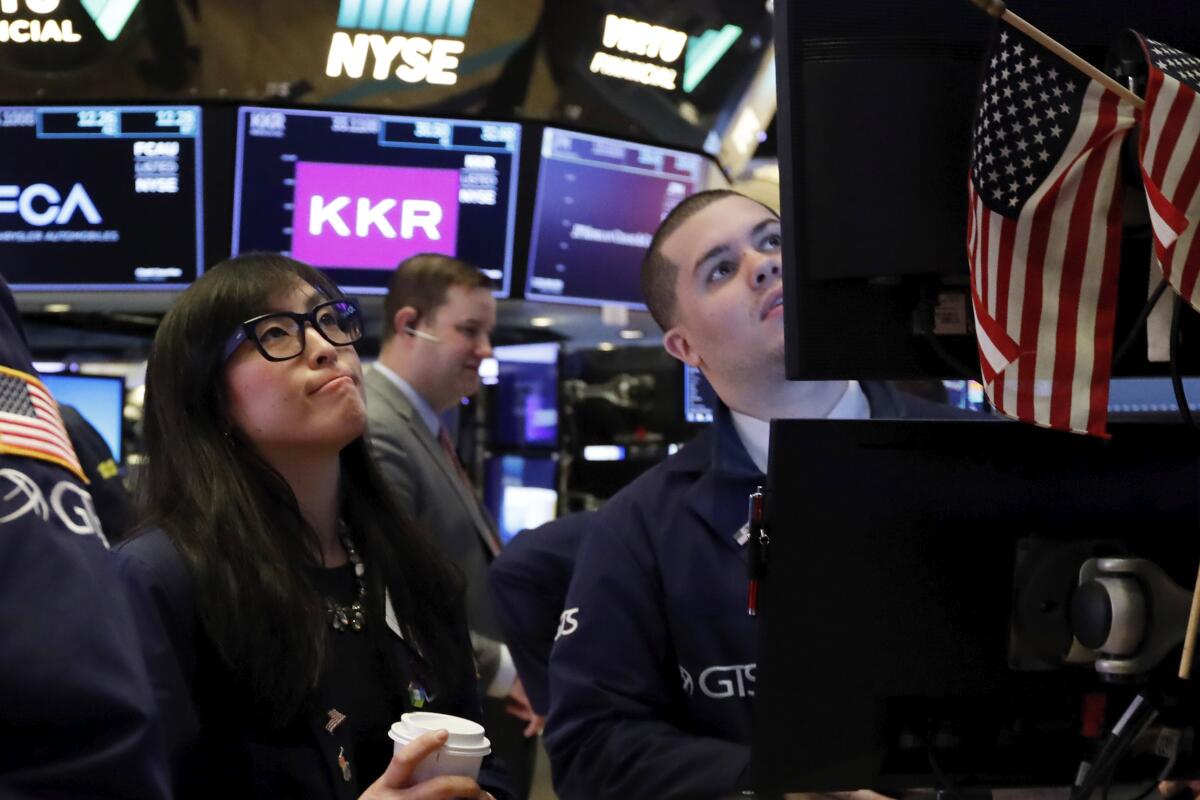Stocks sink further on coronavirus fears; Dow slides more than 3%

- Share via
Stocks on Wall Street fell sharply Tuesday, piling on losses the day after the market’s biggest drop in two years, as fears spread that the coronavirus outbreak will put the brakes on the global economy.
Nervous investors snapped up low-risk U.S. government bonds, sending the yield on the 10-year Treasury note to a record low.
The Standard & Poor’s 500 index has lost 7.6% in the last four trading days since hitting a record high last Wednesday. That’s the benchmark index’s worst such stretch since the end of 2018 and has resulted in $2.14 trillion in losses, according to S&P Global. Tuesday also marked the first back-to-back 3% losses for the index since summer 2015.
The latest wave of selling came as more companies, including United Airlines and Mastercard, warned that the coronavirus outbreak will hurt their finances and as more cases of the virus were reported in Europe and the Middle East, far outside the epicenter in China. Also on Tuesday, U.S. health officials called on Americans to be prepared for the disease to spread in the United States, where there are currently just a few dozen cases.
The Dow Jones industrial average dropped 879 points, racking up a two-day loss of 1,911 points. Travel-related stocks took another drubbing, bringing the two-day loss for American Airlines to 16.9%. The large publicly traded cruise operators have also suffered double-digit losses.
The worst-case scenario for investors — where the virus spreads around the world and cripples supply chains and the global economy — hasn’t changed in the last few weeks. But the probability of it happening has risen, said Yung-Yu Ma, chief investment strategist at BMO Wealth Management.
“It’s the combination of South Korea, Japan, Italy and even Iran” reporting virus cases, Ma said. “That really woke up the market.”
The S&P 500 index fell 3%, the Dow lost 3.2% and the Nasdaq retreated 2.8%, erasing its gains for the year. The Russell 2000 index of smaller-company stocks slid 3.5%.
Technology stocks, which rely heavily on China for both sales and supply chains, once again led the decline. Apple dropped 3.4%, and chipmaker Nvidia slid 4.1%.
Bond prices continued rising. The yield on the 10-year Treasury fell to a record low of 1.31%, according to TradeWeb, before recovering somewhat to 1.35% later in the day. That was down from 1.37% late Monday and far below the 1.90% it stood at in early 2020.
The lower bond yields, which force down interest rates on mortgages and other loans, weighed on bank stocks. JPMorgan Chase shares slid 4.5%, and Bank of America shares fell 5%.
Shares of real estate companies and utilities also fell, though they held up better than the rest of the market as investors favored traditionally safe-play equities.
United Airlines tumbled 6.5% after withdrawing its financial forecasts for the year because of the viral outbreak’s effect on demand for air travel. Mastercard dropped 6.7% after saying the effect on cross-border travel and business could cut into its revenue.
Moderna surged 27.8% after the biotech firm sent its potential virus vaccine to government researchers for additional testing. It’s one of several drug developers racing to develop a vaccine.
HP bucked the trend, climbing 5.7% on Tuesday after the computer maker reported solid first-quarter profits and announced a plan to boost earnings. The company, which is trying to fend off a takeover bid from Xerox, also expanded its stock-buyback program.
Walt Disney, which fell 3.6% in regular trading, took an additional hit in after-hours trading — sliding about 2.5% after the company surprised investors with the news that Chief Executive Bob Iger was stepping down, effective immediately. Disney veteran Bob Chapek, who most recently led the company’s parks and consumer products business, was named CEO. Iger is staying on as executive chairman.
Energy companies have been some of the hardest hit by the coronavirus outbreak, as investors worry that a weakened global economy would burn less fuel. Exxon Mobil is down 10.2% over the last four days, a slump that has wiped away nearly $26 billion in market value. Benchmark crude oil fell $1.53 on Tuesday to settle at $49.90 a barrel.
A rapidly spreading virus also threatens factories, shipments of parts and customers for businesses around the world. At Apple, which said last week that the virus will force it to fall short of a previous quarterly revenue forecast, $158.6 billion in market value has vanished in the last four days.
The chief risk is that the stock market was already “priced to perfection,” or something close to it, before the virus worries exploded, according to Brian Nick, chief investment strategist at Nuveen.
After getting the benefit of three interest-rate cuts from the Federal Reserve last year and the consummation of a “Phase 1” U.S.-China trade deal, investors were willing to pay high prices for stocks on the expectation that profits would grow in the future.
The S&P 500 was recently trading at its most expensive level, relative to its expected earnings per share, since the dot-com bubble was deflating in 2002, according to FactSet.
If profit growth doesn’t ramp up this year, that makes a highly priced stock market even more vulnerable.
More to Read
Inside the business of entertainment
The Wide Shot brings you news, analysis and insights on everything from streaming wars to production — and what it all means for the future.
You may occasionally receive promotional content from the Los Angeles Times.










